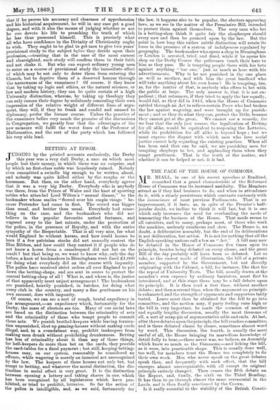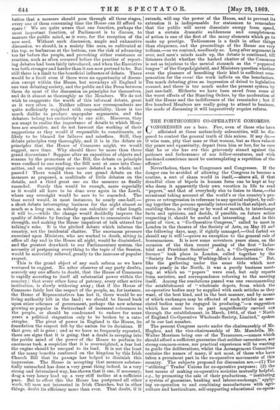THE PACE OF THE HOUSE OF COMMONS.
MIALL. in one of his recent speeches at Bradford, Al remarked that a grand characteristic of the Reformed House of Commons was its increased assiduity. The Members attend as if they had business to do, and when in attendance do it, with a steady persistence which contrasts curiously with the insouciance of most previous Parliaments. That is an improvement, if it lasts, as, in spite of the Premier's halfjocular doubt, we incline to think it will last, but it is one which only increases the need for overhauling the mode of transacting the business of the House. That mode seems to all outsiders, and to many, perhaps most, of those who work the machine, uselessly cumbrous and slow. The House is, no doubt, a deliberative assembly, but the end of its deliberations is not deliberation, but action. It is not for nothing that all the English-speaking nations call a law an " Act." A bill may now be debated in the House of Commons five times upon its principle, besides being debated on every clause, and the great Bill of the day probably will have been so debated. Let us take, as the easiest mode of illustration, the bill of a private member, supported by the Government, but not directly originating with the Cabinet, a bill, for instance, like that for the repeal of University Tests. The bill, usually drawn at the member's own expense by ordinary barristers, must first he introduced, and at this stage there may be a full debate upon its principle. It is then read a first time, without another debate; and then a second time, when the argument on principle is exhausted, and the strength of opponents and supporters fairly tested. Leave must then be obtained for the bill to go into committee, and the motion may, if party feeling runs high or the bill is very important, be made the occasion of another and equally lengthy discussion, usually the most tiresome of all, a sort of scrap-pie of argumentative odds and ends. At last, after three debates upon the principle, the bill reaches committee, and is there debated clause by clause, sometimes almost word by word. This discussion, the fourth, is usually the most useful of all, the House bringing its marvellous knowledge of detail fully to bear,—there never was, we believe, an Assembly which knew so much as the Commons,—and licking the bill, as it were, into practicable shape. This is usually done well, too well, for members trust the House too completely to do their own work. Men who never speak on the great debates speak then, and frequently with such effect, that the bill emerges almost unrecognizable, with all except its original principle entirely changed. Then comes the fifth debate on the Report, and, finally, the sixth on the Third Reading. It has then to go through almost the same ceremonial in the Lords, and is then finally sanctioned by the Crown.
Is it really essential to the stability of the British Consti talon that a measure should pass through all these stages, every one of them consuming time the House can ill afford to spare ? We are quite aware that one function, perhaps the most important function, of Parliament is to discuss, to manure the public mind, as it were, for the reception of the new seed. Without such discussion, ample and exhaustive discussion, we should, in a society like ours, so cultivated at the top, so barbarous at the bottom, run the risk of advancing too far before the people, and provoking either resistance or reaction, such as often occurred before the practice of reporting debates had been fairly introduced, and when the Executive was both stronger and harder than it can now pretend to be. But still there is a limit to the beneficial influence of debate. There would be a limit even if there were no opportunity of discussion except within the House, but nowadays all England is one vast debating society, and the public and the Press between them do most of the discussion on principles for themselves, and do it almost as thoroughly as the Members. We do not wish to exaggerate the worth of this informal debate, great as it very often is. Neither editors nor correspondents are quite sufficiently weighted with responsibility, there is too much dislike to produce unpopular arguments, and the debaters belong too exclusively to one side. Moreover, they are unapt to realize the importance of details to which Members are sensitive, and do not forecast the working of their suggestions as they would if responsible to constituents, or likely to be blamed for failures and missfires. Still, they debate principles very thoroughly, and it is in the debate on principles that the House of Commons might, we would suggest, save time. Why should there be more than three grand discussions ? Suppose after an exposition of objects and reasons by the promoters of the Bill, the debate on principle were confined to one reading, the Bill sent at once into Committee, and on emerging once more debated as a whole, and passed ? There would then be one grand debate on the measure as proposed, a multitude of little debates on the details, and a third great one on the measure as finally amended. Surely this would be enough, more especially as it would all have to be done over again in the Lords, where any oversight would be sure to be amended. The time saved would, in most instances, be nearly one-half,— a short debate interrupting business for the night almost as much as a long one, as nobody can calculate of what length it will be,—while the change would decidedly improve the quality of debate by forcing the speakers to concentrate their strength, and making the House impatient of talk uttered for talking's sake. It is the pitched debate which informs the country, not the incidental chatter. The enormous pressure exercised upon Ministers, who are worked to death, sitting in office all day and in the House all night, would be diminished, and the greatest drawback to our Parliamentary system, the necessity of postponing everything to the topic of the Session, would be materially relieved, greatly to the increase of popular respect.
This is the grand object of any such reform as we have ventured to suggest. No sober observer of any party doubts, scarcely any one affects to doubt, that the House of Commons is rapidly accreting to itself all substantial power within the country ; that every other form of potency, every other active institution, is slowly withering away ; that if the House of Commons fairly lost the respect of the people, as, for instance, the House of Representatives has lost it, there would be no living authority left in the land ; we should be forced back upon other schemes of government, perhaps the new scheme growing so popular in Switzerland of incessant references to the people, or should be condemned to endure for some years a political stagnation only to be broken by a catastrophe. The pivot of power in England is the House, its foundation the respect felt by the nation for its decisions. If that goes, all is gone ; and as we have so frequently repeated, there are signs that it is going, that a doubt is creeping into the public mind of the power of the House to perform its enormous task, a suspicion that it is overweighted, a fear lest the engine should be unequal to its load. It is not the least of the many benefits conferred on the kingdom by this Irish Church Bill that its passage has helped to diminish this impression. The House in accepting that measure substantially untouched has done a very great thing indeed, in a very strong and determined way, has shown that it can, if necessary, drag a very heavy load up a very stiff incline at a sufficient pace. But to effect this the House has postponed all other work, till men not interested in Irish Churches, but in other things, doubt its efficiency more than ever. That doubt, if it
extends, will sap the power of the House, and to prevent its extension it is indispensable for statesmen to remember that the public will never dissociate energy from speed, that a certain dramatic suddenness and completeness of action is one of the first of the many elements which go to make up prestige. Tediousness is a fault in other things than eloquence, and the proceedings of the House are very tedious,—as we contend, needlessly so. Long after argument is over, and men's minds made up, the debate is continued, till listeners doubt whether the hashed chatter of the Commons is not as injurious to the mental stomach as the " peppered tongue " of the CorpsLegislatif, and Ministers question whether even the pleasure of benefiting their kind is sufficient compensation for the ennui the work inflicts on the benefactors. Too much debating gives an impression of drivel to legislative counsel, and there is too much under the present system by just one-half. Hitherto we have been saved from some of the worst effects of the Standing Orders, by the moderation of half the House and the indifference of the remainder ; but if five hundred Members are really going to attend to business, the mode of discussing it will imperatively require reform.































 Previous page
Previous page